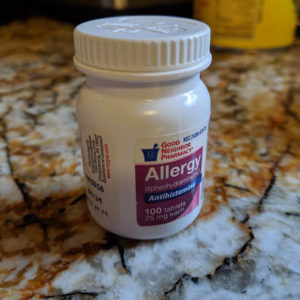Also sold as “diphenhydramine,” this allergy medicine is used by many to help them fall asleep.
Life happens.
The usual way of ensuring you get a good night’s rest should be to be active during the day, get some exposure to the sun, avoid drinking too much coffee too close to bedtime, and be relaxed. That’s what the best sleepers do.
Unfortunately, sometimes life interferes with the usual way of falling asleep. One or all of those things that help people fall asleep don’t happen.
When they don’t, it makes sense to use something to help you get some sleep. Sleeplessness can be a direct threat to your long-term health and safety.
One of the common things people take is an over-the-counter antihistamine called diphenhydramine. One of the brand names it goes by is Benadryl. Listed as diphenhydramine, it’s also found in the “PM,” “nighttime,” or “nighttime cold” formulations of other combination medicines.
It’s a very commonly used—and abused—drug.
As with many other drugs, it’s easy to get in the habit of taking it.
Officially, Benadryl isn’t a sleep aid
Its well-documented sleepiness effect is what’s known as an “off-label” usage. When undergoing testing, diphenhydramine was never tested specifically for its effect as a sleep aid. Its primary usage is as allergy medicine. Sleepiness is a side effect. Side effects don’t happen consistently. A 2015 literature review found its efficacy as a sleep aid questionable at best.
Despite all this, diphenhydramine is commonly found in skilled nursing facilities and is frequently provided as a sleep aid.
If you’re one of those people who swears Benadryl doesn’t work for you as a sleep aid, you’re not alone.

Interestingly, the medication is sometimes combined with melatonin and is specifically marketed as a sleep aid. ZzzQuil has this formulation. Though melatonin isn’t considered a sleeping pill, it works well enough to be marketed this way. It’s a hormone replacement.
Before you take any medication — especially any combination medication — make sure you know what’s in it. You especially want to know the active ingredient. You want to make sure you don’t take a nighttime formulation of something and then take additional diphenhydramine on top of that. Then, realize you’ve taken some allergy medicine with diphenhydramine.
In doses that are too high, the medication has a paradoxical effect. Too much diphenhydramine is anything but restful. Some people who have tried to kill themselves by taking too much of the stuff. They thought they’d drift off to sleep and die. Instead, they felt incredibly tense and agitated as their body metabolized the substance. They felt terrible as they became even more mentally unhinged.
While many factors can go into the actual effect of a given medication and dosage, too much diphenhydramine definitely has the opposite effect of aiding one in going to sleep.
Benadryl for sleep dose
The correct dosage for sleep is 25-50 mg. The medication is often found in 25 mg tablets or capsules. Always use as directed on the particular package for the most accurate information about your situation.
How does Benadryl cause you to sleep?
It’s a drug that’s classified as an antihistamine. That means the drug works to counteract histamine. Histamine is a compound that’s produced by your body. It’s found in most living creatures.
In the body, the compound has several different roles. One role is to aid your body’s defense force in attacking invaders. Histamine helps white blood cells access the damaged tissue. As a process, this is known as inflammation. Histamine also acts as a messenger, allowing the body to send signals from one cell to another.
The compound also has a role in keeping people awake. When you diminish the effects of histamine, you diminish the effects of histamine keeping people awake. Sleepiness is a side effect of the medication.
How long does Benadryl make you sleepy?
Many people report that Benadryl makes them sleepy for a couple of hours. It’s hard to give a great answer to this question because if you happen to fall asleep when taking Benadryl, you’ll keep sleeping even after its effects have worn off.
Is diphenhydramine and Benadryl the same thing?
Yes, diphenhydramine is the generic name for Benadryl. Any manufacturer can make the medication and call it diphenhydramine. It’s often sold for less labeled as diphenhydramine.
What happens if you take too much Benadryl?
The symptoms of a Benadryl overdose can play out in two different ways. Some people experience extreme drowsiness, blurred vision, a fast heart rate, vomiting, and hallucinations. Some other people become agitated instead of drowsy.
Unfortunately, there have been “Benadryl Challenges” on the Tik Tok social media platform and this has resulted in teenagers’ deaths.
One needs to stick to the recommended doses of Benadryl even if it doesn’t work for sleep.
It’s a safe medication if used as directed but not at all harmless if abused.
Use Benadryl sparingly to aid with sleep
It’s not a good idea to use this medication every night to help you go to sleep. It’s an important medication in that it’s common to use to treat allergies and side effects of other medications.
With too much regular usage, your body gets used to it. Histamine doesn’t suppress when you want it to. If you’re having a life-threatening allergic reaction, you want diphenhydramine to work as well as it can. If you’re regularly bothered by itching or allergic reactions at night, try to sort out the cause.
Medication should be a stop-gap measure. In addition, the effects of this over-the-counter medication persist for a relatively long time. It doesn’t clear your system very rapidly. You can find yourself too sleepy when you don’t want to be sleepy. You’ll turn to stimulants and then a vicious cycle ensues.
It’s far better to try some alternatives to diphenhydramine for sleep first, like improved bedtime rituals, earplugs, relaxation techniques like meditation beads, warmed milk or lavender oil. In certain cases, cutting down on coffee and caffeine can help.
Other articles that may be of interest:
Creative or want to be? Remember to keep an idea notebook handy
Should you bore yourself to sleep?
Sleep less at night and stay healthy
The quick guide to finding and listening to sleep music
James Cobb RN, MSN, is an emergency department nurse and the founder of the Dream Recovery System. His goal is to provide his readers with simple, actionable ways to improve their health and maximize their quality of life.
Some of the links in this post are affiliate links. This means that if you click on the link and purchase the item, the DRS receives a small commission at no extra cost to you. All opinions remain independent.
